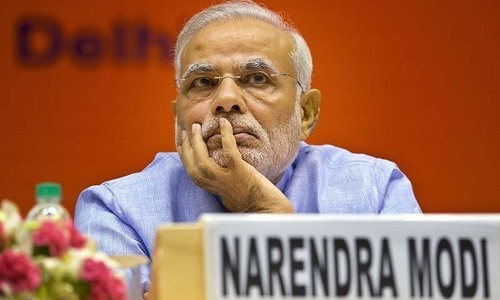Former Indian PM Atal Bihari Vajpayee passes away
Former Indian prime minister Atal Bihari Vajpayee died at 93 on Thursday, Narendra Modi confirmed on Twitter.
Vajpayee had been hospitalised in the All India Institute of Medical Sciences (AIIMS) for more than two months after being admitted for treatment of a kidney infection and chest congestion. He had suffered a stroke in 2009.
Vajpayee, who was elected as Indian premier thrice, was a Hindu nationalist who was seen as a skilled politician by his supporters. A former journalist and poet-turned-politician, Vajpayee is credited with helping lay the foundations for the meteoric rise of the Bharatiya Janata Party (BJP) — the political powerhouse that rules India today.
In 1998 he ordered nuclear weapons tests that stoked fears of atomic war with Pakistan but he later launched a groundbreaking peace process with Islamabad.
Analysis: How Modi upended predecessor's quiet diplomacy
Critics accused him and his party of stoking public fears of India's large Muslim minority. Both sides agreed he was that most rare thing in Indian politics: a man untainted by corruption scandals.
In 2014, he was awarded the Bharat Ratna, India's highest civilian honour, by current premier Modi.
The Indian prime minister had visited him on Wednesday night and Vice-President Venkiah Naidu on Thursday.
"India grieves the demise of our beloved Atal Ji," Modi said. "His passing away marks the end of an era."
Indian President Ram Nath Kovind tweeted his condolences on the news and called the deceased a "true Indian statesman".
"His leadership, foresight, maturity and eloquence put him in a league of his own. Atalji, the Gentle Giant, will be missed by one and all," he said.
The vice president called him an "effulgent shining star in India's political firmament".
FO's condolence message
The Foreign Office (FO) in Islamabad issued a statement of condolence on the former Indian prime minister's death.
"We have learnt with sadness the passing away of Mr Atal Bihari Vajpayee, former prime minister of India, who was undergoing treatment in a hospital in New Delhi," it said.
The statement adds: "Mr Vajpayee was a renowned statesman who contributed to bringing a change in India-Pakistan relations and remained a key supporter of SAARC and regional cooperation for development."
Expressing solidarity with India, the foreign office said: "The government and people of Pakistan extend their heartfelt condolences to his family and to the government and people of India."












































